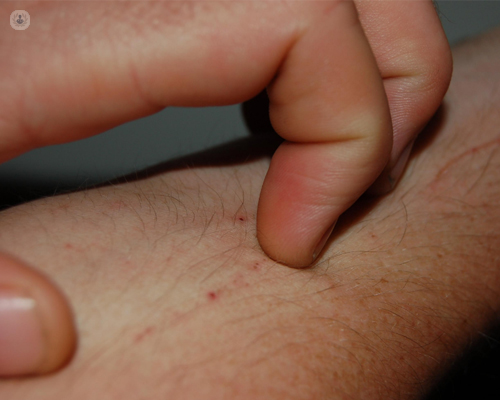


What are allergic reactions?
Allergic reactions are hypersensitive responses to contact with certain substances known as allergens. When the patient comes into contact with the allergen their immune system reacts in a variety of ways. In some cases, the symptoms are mild and only a minor annoyance, while in other cases the reaction can severe and involve life-threatening symptoms.
Allergies are common among the UK population – over 20% of people are affected by an allergic disorder , and this number is continuously rising. The most common causes of allergic reactions are pollen, pets such as cats and dogs, insect stings from wasps and bees, and food such as peanuts, milk and eggs.

Condition prognosis
Allergic reactions are common and appear after contact with an allergen. The allergic reaction may be mild or moderate, and in some cases they can potentially be fatal. The reaction may be localised to one area of the body or it may spread throughout the body. Overall, the prognosis depends on your sensitivity to the allergen and your access to emergency treatment.
What are the symptoms?
The most common symptoms of a mild allergic reaction include:
- localised itching
- red or watery eyes
- rash
- nasal congestion
- neck and face hives.
In a moderate or serious allergic reaction symptoms may include:
- abdominal pain
- chest discomfort or tightness
- diarrhoea
- swelling in different parts of the body
- nausea and / or vomiting
- loss of consciousness
- dizziness
- difficulty breathing or swallowing
The most severe type of allergic reaction is known as anaplylaxis, which is a sudden combination of restricted breathing and a sudden drop in blood pressure.
How is an allergic reaction diagnosed?
To diagnose an allergic reaction the doctor will usually carry out a clinical examination and ask about your history of symptoms. If it is not clear what caused the reaction, there are a number of tests that can be carried out to help identify the cause, including:
- challenge tests – usually carried out to diagnose a food allergy, this test involves eating the food under supervision of a doctor and seeing if it causes an allergic reaction
- blood tests – this measures an allergy antibody known as the IgE antibody, to see if it has altered in response to an allergen
- skin prick tests – this involves placing a drop of the allergen on the arm and using a small tool to look for any micro-reaction
What causes allergic reactions?
Although we have a good idea of the most common causes of allergic reactions, it is not yet clear why some people are allergic and others are not. However, it appears to be the case that if you have a family member with a particular allergy you are more likely to have that allergy as well.
How can they be prevented?
The main way to prevent allergic reactions in the future is to identify what is causing the reaction and take steps to avoid contact with the substance in the future.
However, it is not always possible to prevent yourself from coming into contact with an allergic substance, particularly if you have a high sensitivity to it. Therefore for more severe types of allergy (e.g. those which cause difficulty breathing or anaphylaxis), the doctor may advise you to carry medication with you at all times to mitigate and control the symptoms.
What is the treatment?
Treatment for allergy depends on the type of allergic condition. For example, if you have a severe food allergy, your care plan will look different to someone who has asthma. Some types of allergy can be cured with a programme of immunotherapy, which involves regular controlled exposure to the allergen to build up your body’s tolerance.
However, for most people allergic reactions can be treated with a number of medications, including:
- antihistamines which relieve the symptoms of hay fever, hives, and insect stings
- steroid cream or tablets to reduce inflammation
- decongestant to treat blocked nose
What specialist should I see?
An allergist is the specialist who can diagnose and treat allergic reactions and the underlying allergy involved.